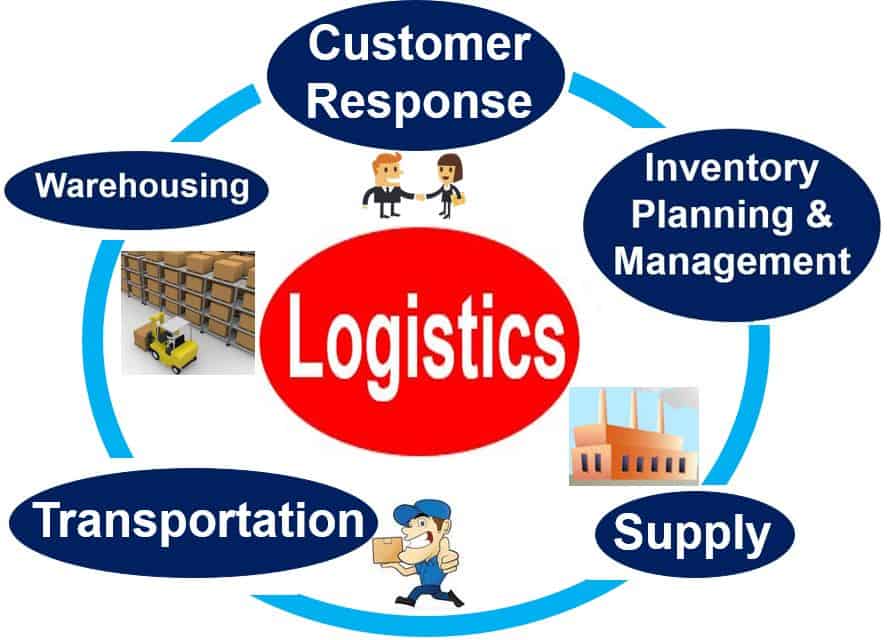Logistics is basically ensuring that all the material and personnel are in the right place at the right time to make sure that a project or a business objective is accomplished. In the military, it is the science of planning and carrying troops and equipment, plus the movement and maintenance of forces.

The word can be used as a singular or plural noun, i.e. we can say either logistics ‘is’ or ‘are’.
Logistics in the world of business
In business, logistics is the management of the flow of things between their point of origin and their final destination in order to meet the needs of companies and customers. It is a subset of supply chain management.
The resources managed in logistics include a wide range of items, including:
- Food
- People
- Animals
- Materials
- Time
- Information
- Vehicles, Boats and Airplanes
The logistics of physical things – things we can touch – generally involves the integration of material handling, information flow, production, packaging, transportation, inventory, warehousing and security.

Origin of logistics
Some economic historians and etymologists (they study the origin of words) say that evidence points to the term coming from the late nineteenth century – from the French word logistique (loger = to lodge), and was first used by Baron de Jomini, (1779-1869), a Swiss officer who served first as a general in the French and later in the Russian service.
Others say it came from the Greek word λόγος (pronounced: lauvos), which means ‘reason’ or ‘speech’, and λογιστικός (pronounced: lehisticoz), which means ‘responsible for counting’ or ‘accountant’.
According to etymonline.com, logistics originates from:
“Art of moving, quartering, and supplying troops,” 1879, from French (l’art) logistique “(art) of quartering troops,” which apparently is from Middle French logis “lodging” (from Old French logeiz “shelter for an army, encampment.”
What does a logistician do?
A specialist in logistics is called a logistician. They analyze and coordinate a business’ or organization’s supply chain – the system that moves products from supplier to consumer.
Logisticians manage the whole life cycle of a product, starting from where it is acquired, then distributed, allocated and finally delivered. They exist in virtually every industry.
Typically, logisticians do the following:
- Foster business relationships with both suppliers and customers.
- Strive to determine what customers’ needs are, understand them, and how to make sure they are met.
- Determine where materials, supplies and finished products go.
- Find the cheapest and fastest way to move goods.
- Assess each logistical function, and try to improve those identified as needing improvement.
- Present plans, assessments and performance data to management.
- Make suggestions and proposals to management and customers regarding improvements.
- Keep informed regarding latest advances in logistics technology and incorporate new technologies into current procedures.
A logistician oversees several activities of a company, including purchasing, shipping and delivery, inventory, and warehousing. He or she uses sophisticated software systems to plan and monitor the movement of goods.
In the realm of international trade, logistics plays a critical role in customs clearance and ensuring compliance with various countries’ regulations and trade agreements.
Logisticians are also essential in disaster response scenarios, orchestrating the rapid deployment of resources to affected areas to facilitate recovery efforts.
In the United States, the federal government is one of the largest employer of logisticians. Many logisticians who work in the military are, in fact, civilians. Any company that is involved in deliveries, such as couriers and freight shipping businesses, will have a large team of logisticians.
Video explanation
